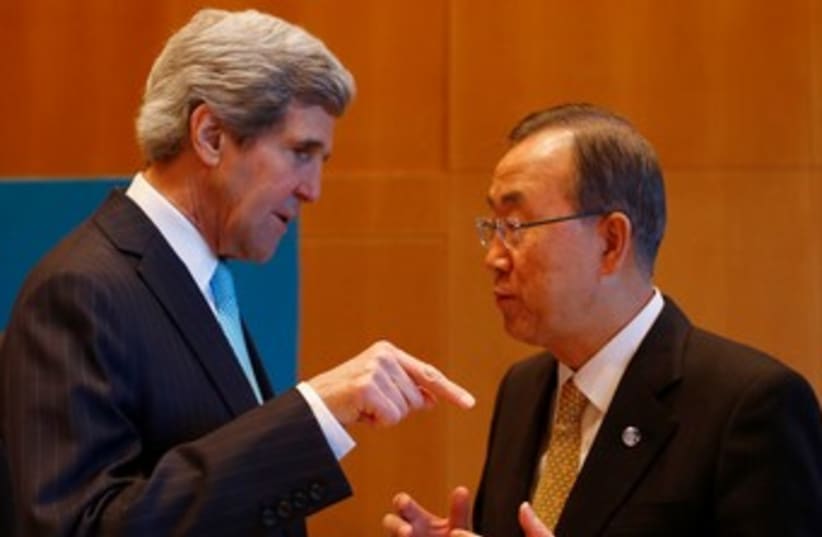WASHINGTON/NEW YORK – Delegations from 40 countries converged on Montreaux, Switzerland, on Wednesday to begin the first high-level conference on Syria since civil war began there in 2011.
The conference began with meetings between chief diplomats from Russia, the European Union and the United States, as well as from Arab states torn over the sectarian nature of the struggle that has made Syria a vacuum for foreign resources and a haven for Islamic extremists.
The conference, months in the planning, is meant for international parties – including the government of embattled Syrian President Bashar Assad, and the rebels fighting for his ouster – to agree on a framework that implements a document from June 2012 called the Geneva communiqué.The communiqué calls for a transitional government in Syria that includes members of the Assad government and representation from the opposition.But in a prepared statement, US Secretary of State John Kerry reinforced America’s long-standing position that Assad himself has no place in a future Syrian regime, transitional or otherwise.“Bashar Assad will not be part of that transition government,” Kerry said. “There is no way – no way possible in the imagination – that the man who has led the brutal response to his own people could regain the legitimacy to govern.“One man and those who have supported him can no longer hold an entire nation and a region hostage,” the secretary continued. “The right to lead a country does not come from torture, nor barrel bombs, nor Scud missiles.”At the end of the first day of the conference, despite the loud and continuous protestations of a single reporter in the front of the press corps, UN Secretary- General Ban Ki-moon and Special Representative of the UN and the Arab League Lakhdar Brahimi managed to give a joint press conference.Both men remained optimistic in the face of further questions about Iran’s exclusion from the conference and the seeming gap in priorities between the delegations of the Syrian government and the Syrian opposition.“Our objective is still to implement the Geneva communiqué,” Ban told reporters in Montreaux. “Everyone has come with a clear understanding that this is the basis of these talks.... I am glad [that] for the first time since the beginning of the conflict, the two parties are sitting down together.”Ban fielded several questions about the extension and subsequent withdrawal of the invitation of the Iranian delegation, a fact that was thrown into sharp relief after the Syrian foreign minister made comments on Wednesday rejecting parts of the Geneva communiqué and insisting that Assad could not be removed from power. One reporter commented that the two sides seem to already be at an impasse.“The Syrian government is a direct party to this crisis,” Ban explained. “If either of the two main parties don’t participate, then this meeting couldn’t happen.”Ban maintained that Tehran’s refusal to accept the Geneva communiqué’s mandate – establishing a transitional government in Syria with full executive powers – was what excluded it. As for the president, he said, “The status of Assad needs to be determined by the Syrian people.”Ban also expressed some disappointment that Iran was not present, despite the lack of written assurance that it would support the conference’s goals.“I’ve always said that all regional countries, including Iran, should be part of this process,” he said. “That is why I thought they should be invited.”Ban said that overall, it was a “very successful meeting, harmonious and constructive, with productive contributions from both sides.”Syrian Ambassador to the UN Bashar Ja’afari disagreed.Speaking to reporters, he said the Syrian government felt there was an “imbalance” in the format of the conference, given that “up to two days ago, the organizers of this meeting decided to add 10 more countries… seemingly preselected in a way that most of them would be anti-Syrian [government] delegations, and coincidentally, paradoxically, the secretary-general excluded Iran.”Ja’afari also said he found many of the statements made by the delegates “discouraging to national political dialogue.”“It was a kind of provocative statements, repetitive statements, old language based on hatred toward the Syrian government and based on a kind of blind provocation which is counterproductive, fruitless and unsuccessful. Not positive at all,” he said.Kerry took a more positive view, saying many of the presentations by the ministers were “articulate and well thought-out,” and lauding this as the first time the two parties have “sat in the same room since the war began.”The very fact that the conference took place is significant, State Department deputy spokeswoman Marie Harf commented in Washington, while lamenting that some of the statements from the Assad government were “not based in any sort of reality.”“We’ve repeatedly said that the security situation in Syria has led to the rise of terrorists there,” she said.Harf said the decision to call on Ban to rescind Iran’s invitation to the conference would not affect negotiations between world powers and the Islamic Republic over its nuclear program.“We wanted them to endorse the Geneva communiqué, as did everyone else,” she said. “Both we and the Iranians have a desire to keep them separate.”The second day of the conference will commence on Friday, with inter-Syrian talks in Geneva.